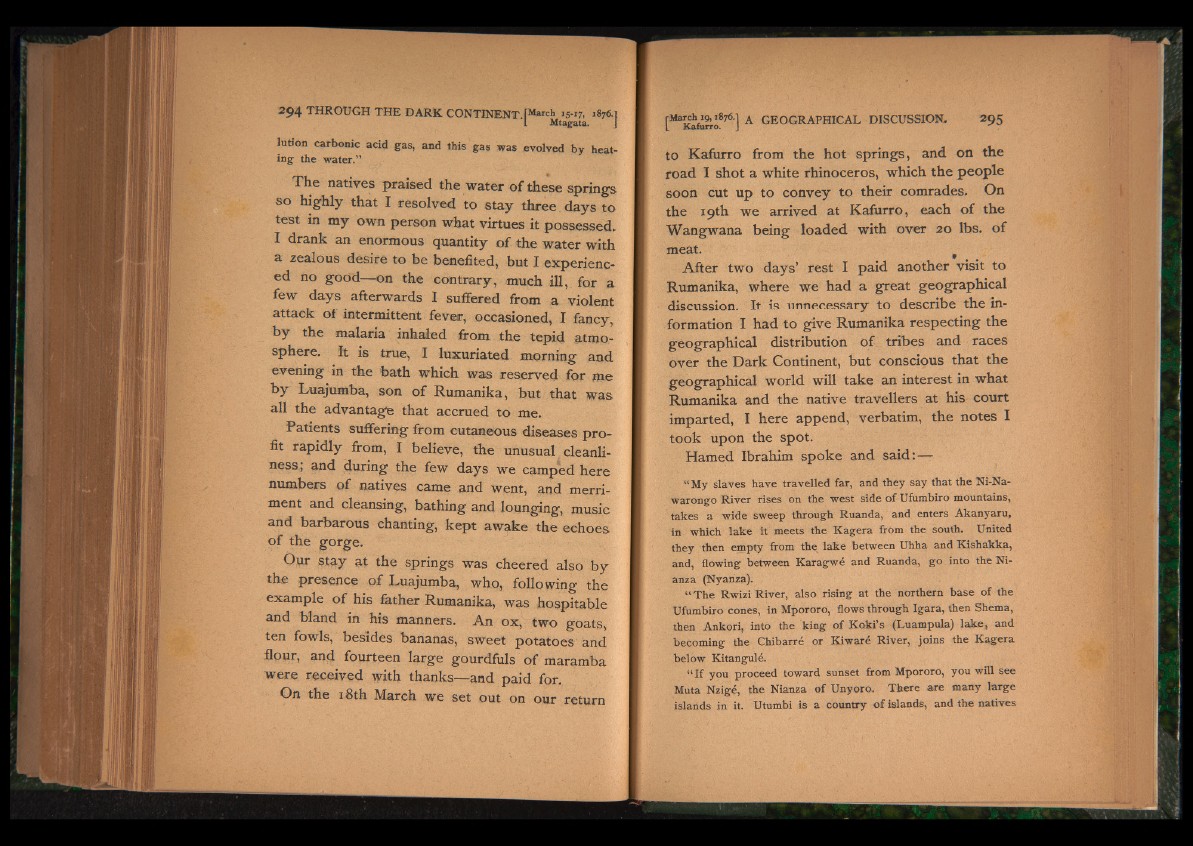
lution carbonic acid gas, and this gas was evolved by heating
the water.”
T h e natives praised the water o f these springs
so highly that I resolved to s ta y three days to
test in my own person what virtues it possessed.
I drank an enormous quantity o f the water with
a zealous desire to be benefited, but I experienced
no good— on the contrary, much ill, for a
few days afterwards I suffered from a violent
attack o f intermittent fever, occasioned, I fancy,
b y the malaria inhaled from the tepid atmosphere.
It is true, 1 luxuriated morning and
evening in the bath which was reserved for jpe
b y Luajumba, son o f Rumanika, but that was
all the advantage that accrued to me.
Patients suffering from cutaneous diseases profit
rapidly from, I believe, the unusual cleanliness;
and during the few days we camped here
numbers o f natives came and went, and merriment
and cleansing, bathing and lounging, music
and barbarous chanting, kept awake the echoes
o f the gorge.
Our stay at the springs was cheered also b y
the presence o f Luajumba, who, following the
example o f his father Rumanika, was hospitable
and bland in his manners. A n ox, two goats,
ten fowls, besides, bananas, sweet potatoes and
flour, and fourteen large gourdfuls o f maramba
were received yrith thanks— and paid for.
On the 18th March we set out on our return
to Kafurro from the hot springs, and on the
road I shot a white rhinoceros, which the p eop le
soon cut up to convey to their comrades. On
the 19th we arrived at Kafurro, each o f the
Wangwana being loaded with over 20 lbs. o f
meat.
After two days’ rest I paid another visit to
Rumanika, where we had a great geographical
discussion. It is unnecessary to describe the information
I had to give Rumanika respecting the
geographical distribution o f tribes and races
over the Dark Continent, but conscious that the
geographical world will take an interest in what
Rumanika and the native travellers at his court
imparted, I here append, verbatim, the notes I
to ok upon the spot.
Hamed Ibrahim spoke and sa id :—
“My slaves have travelled far, and they say that the Ni-Na-
warongo River rises on the west side of Ufumbiro mountains,
takes a wide sweep through Ruanda, and enters Akanyaru,
in which lake it meets the Kagera from the south. United
they then empty from the lake between Uhha and Kishakka,
and, flowing between Karagwe and Ruanda, go into the Ni-
anza (Nyanza).
“ The Rwizi River, also rising at the northern base of the
Ufumbiro cones, in Mpororo, flows through Igara, then Shema,
then Ankori, into the king of Koki’s (Luampula) lake, and
becoming the Chibarre or Kiware River, joins the Kagera
below Kitangule.
“ If you proceed toward sunset from Mpororo, you will see
Muta Nzige, the Nianza of Unyoro. There are many large
islands in it. Utumbi is a country o f islands, and the natives